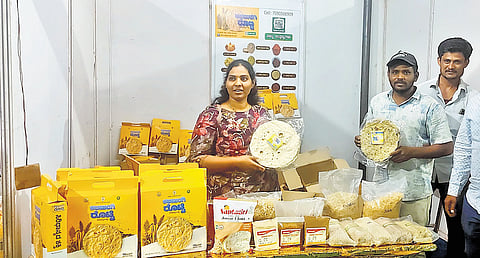

KALABURAGI: Kitchens can transform lives.
A humble initiative that was started one-and-half year ago to make rottis in Kalaburagi district under the district administration's guidance has remade hundreds of women into confident entrepreneurs--it has given them a backbone.
'Kalaburagi Rotti,' made of jowar, the king of millets, is now the preferred choice among the health-conscious.
These rottis, made and sold by Kalaburagi Rotti Utpadakara Sahakara Sangha (Kalaburagi Rotti Producers Cooperative Society), has now caught the culinary imagination of the state. Every day the society sells up to 3,000 rottis and enticing chutneys to go with them.
These healthy rottis range from soft, kadak , sajji, dhapati and sengada holigi varieties. They are simply a click away. It is available on online platforms such as Amazon. One can also place orders at www.kalaburagirotti.com, an easy to navigate and user-friendly website.
It was Kalaburagi Deputy Commissioner Fouzia Taranum who acted as the catalyst in the kitchen to set up the society.
Kalaburagi district has 90% rain-fed area under cultivation and jowar and bajra are the staple food. The society buys rotti from 150 Women Self Help Groups based in rural as well as urban areas of the district. Each of these women SHGs have at least six members. The SHGs prepare rotti and sell them to the Cooperative Society.
"Rotti namaga illitana bari hotti tumbastittri yappa, Eega Kalaburagi Rotti Kendra namaga kaitumba hanaanuu kodlikattada (Rotti was so far used to satisfy our hungry stomach, but now Kalaburagi Rotti Kendra is giving us handful of money for the rotti we prepare, sir)" says Ayyamma Kumbar, a serene and confident homemaker, who had never thought of essaying an entrepreneurial role in her village life till the society came along.
Like Kumbar, over 1,000 women have become part of this health food network. Thanks to the initiative of Taranum, these women have found a way for earning money, instead of restricting themselves to homes by becoming member of women self-help groups.
The district administration offered its ample support to the women to form the SHGs. The administration gave them financial subsidy for buying machines to prepare rottis.
Sharanamma Patil, head of Manjunath Food Producers Women SHG at Nandur in the outskirts of Kalaburagi, told TNSE that six women work in her self-help group and they prepare at least 600 to 700 rotti every day. About 400 rottis are supplied to the society at a rate of Rs 5 per rotti. The SHG members get Rs 2.50 per rotti and earn at least Rs 250 per day. Soft and kadak rottis are sold at Rs 5 and other items are a little more expensive, said Sharanamma.
Samad Patel, Joint Director, Agriculture Department, is the link between the district administration and Rotti Producers Cooperative Society. Patel said that Maldandi variety of jowar is being used for preparing rotti as it is locally grown and has nutritious content.
The Deputy Commissioner Taranum told TNSE that the idea behind the rotti society was to empower women with locally available resources.
Taranum said that due to urbanization, food habit has shifted mainly to rice and wheat. "This change in dietary pattern has resulted in women becoming anemic. In our bid to provide healthy food to people, we decided to promote rotti. Through branding of ‘Kalaburagi Rotti’ Kalaburagi the district administration planned to re-introduce millet as food. Jowar is called the king of millets where as bajra is rich in iron content. The initiative has succeeded in providing employment opportunity to women, stabilise price of jowar and bajra, thereby create a win- win situation for all," said the DC.
"To promote rotti we provided rotti making machines to more than 100 women entrepreneurs / SHGs under different schemes of agriculture and allied departments of the district," said Taranum. Taranum was recently bestowed with a national award for the district's success with Kalaburagi Rotti.
Food experts have lauded the 'Kalaburagi Rotti' initiative. According to them, farmers get good prices for jowar and bajra. Rotti is not only a nutritious food, it is good also for diabetic, BP and the elderly with various medical benefits, they point out.
Sharanu R Patil, President, Rotti Producers Cooperative Society, told TNSE that the society is receiving orders for up to 3,000 rottis daily. The society buys rotti at Rs 5 from producers and sells at Rs 7 at the counter. A rotti pack containing 10 rottis are being sold at Rs 110/- per pack, he said. Consumers can also buy chutney such as karella hindi, sengada hindi, etc on online and at outlets. With 'eat healthy' concept gaining acceptance across the state, there are many takers for Kalaburagi Rotti in urban centres. The society has recently opened a 'Kalaburagi Rotti' counter at HSR Layout in Bengaluru.
The Kalaburagi district administration along with the agriculture department has taken the lead in the branding of 'Kalaburagi Rotti'. It has been registered with platforms such as Zomato and Swiggy. A QR code has been created. A big online marketing push is on the way to make 'Kalaburagi Rotti' the taste of Karnataka.